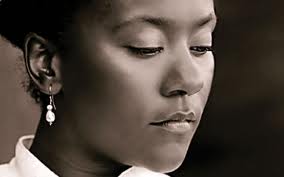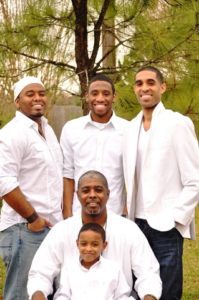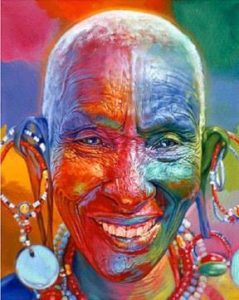by James Weeks | Jul 5, 2013 | Blog

Indra
The sun was slowly descending when I spoke to Indra.
She lives in Denmark and the further north you go it’s the land of the midnight sun, she says. By the tip of Norway, it’s bright until midnight.
But winters there are the “darkest of dark”. And that’s one of the reasons why this gifted vocalist is looking forward to moving back to the U.S.
Indra Rios-Moore isn’t exactly a house-hold name yet, but give this New-York native and daughter of Osun some time. After all, you’re dealing with a powerful force of nature. And Osun cannot be restrained.
Indra “could easily approach the leagues of the great jazz singers like Ella Fitzgerald and Sara Vaughan,” says critic, Jacob Baekgaard, in an article published on www.allaboutjazz.com.
And Bessy Reyna, a columnist for CTLatinonews.com, says: Indra “is a remarkably talented singer who can render either a bolero like “Mil Besos” or a sensual “Teach Me Tonight” with equal easy, holding her audience in an intimate and warm embrace which is nearly impossible to escape.”
Born of a Puerto Rican mother from Ponce and an African-American/Syrian father, Indra has been singing since childhood. At 14, she attended the prestigious Mannes College of Music in New York. She later studied classical vocal training at Smith College.
She sings in Portugese, English, Spanish and Italian. And although she’s drawn to traditional jazz standards, re-styled American folk and RB songs, she’s plans to include a song for Osun on her next CD which will be recorded in August 2013.
To purchase Indra’s CD’s, visit her website at: http://indra.dk/sider/info_eng.html
Here’s a clip of this daughter of Osun in action:
I am moved by Indra’s spirit and wisdom. Here’s what she had to say in our recent interview.
Why She Sings
“To be perfectly honest. I sing for myself. I sing for my own wellness. It’s something that I’ve always had to do. It’s like I have to breathe; I have to sing. That’s what keeps me going. It heals me from the inside. And when I find that other people feel a similar feeling, I feel even more compelled to do it. It’s not just helping me; it’s helping other people. It’s serving a higher power.”
When It All Began
“I first started singing when I was about four or five years old. I would sing to myself because it lifted me up. And you might think, ‘why does a four-year old child need lifting up?’ I had a good childhood. I was not abused or anything. Everything was fine. But even though everything was fine, I still needed lifting up. You don’t need to be sick in order to be healed. I think everyone needs lifting up. No matter what state you’re in you can always be higher. Higher in the sense of connectedness. For me, that’s what healing from the inside means. It means feeling more connected because we can have moments throughout the day where we find our mind wandering or perhaps we’re too far up in our head and we don’t feel connected. Connected to what? Connected to one another, the universal force, to love, to creativity, to that magical thing that happens that no one can put a name to.”
Her Love For The Orisas
“I’ve been surrounded by Santeria my whole life. Growing up in the lower east side of New York, there were lots of santeros and santeras. You would see people dressed in white and people would whisper, ‘Oh, he’s making santo, oh, she’s making santo’. My mom would always worship Yemoja because she’s a daughter of Yemoja. For me, I always knew I was a daughter of Osun. Whenever I would hear her name, I knew that she was mine and I was hers. It was not even a question in my head. Ironically, I found out from Mom that I had this little wooden figure that I would play with growing up. I asked Mom one day, ‘What is this wooden figure?’ She said: ‘I got it from a friend of mine when I was pregnant with you but didn’t know I was pregnant. He said: ‘This is from Nigeria. This is the fertility Goddess, Yemoja.’ When I heard that story, I had to learn more about the pantheon of Gods and Goddesses.”
Being Open About Her Faith
“I’ve been open about my spirituality since 2002 because when I was in college, I was studying Afro-Latin literature. I had a professor who was an iyawo at the time, and she invited me to a ceremony for Obatala. During the ceremony, Obatala recognized me as a daughter of Osun and I started to cry. He gave me a gift – a white cloth with gold figurines on it. And I remember thinking, ‘I can’t take this. I can’t accept this.’ But I couldn’t reject it because it was coming from Obatala and I felt such love for him. As soon as the ceremony was over, I tried to hand the gift over to one of my professor’s, and she looked at me and said, ‘Don’t ever reject a gift from God.’ And I said, from this moment on, I’m going to be ‘out and about’ [my faith]. It’s a spiritual gift to be cared for by a Goddess or a God – a piece of the divine energy that is connecting all of us. I can’t reject that gift nor should I hide in the shadows because others might not understand. This is something to be proud of. To be happy about. It’s a beautiful thing. It’s such an immense blessing that when I think about it, I want to cry. I feel so utterly protected, loved and cared for. During a storm, I literally feel like I am being picked up by the energies of the orisas. It protects me, loves me, and informs me when I can’t think. I don’t need to think. I just need to be quiet and listen. I feel very lucky because there are so many people who are lost. They don’t know up from down. They read books trying to find their way and that’s good. But I feel lucky that, at an early age, I could feel the energies of the orisas. I could give the energies a name, and they could live in my life.”
Before She Hits The Stage
“I always say a prayer to help me get out of the way. What I do on stage is not about performance. I’m not there to entertain. I’m there to get out of the way. My physical body contains a voice that is anatomically pretty. God created vocal chords in my throat and in my neck that operate in such a way that they produce a beautiful sound. That’s fine and dandy. There are lots of people like that. But there’s a special juice in my vocal chords and that’s God – that’s God delivering what God needs to deliver. And so I try to get out the way.”
Song For Osun
“We’re doing a song for Osun on the 3rd CD. Part of me was like: ‘Do I dare do this?’ And the answer was ‘Yes! Yes! Yes! Let’s do this. There are always those people in our community that are gonna say: ‘You didn’t do that properly. You need to do the songs in the right order.’
Well, call me naive, but I really feel that if you do things with the right intent, that means more than the ritual. The ritual is a process that we carry forward generationally to embody something that is more than the physical. Ritual exists for a purpose and that purpose is important. But the intent is 99% of it. If you go in there with the wrong intent, but the right ritual, what’s that going to serve? I feel moved to do this song, and if I do it with all my heart, and Osun knows how much I love her, then how can I go wrong?”
By James Weeks
Producer, Across The King’s River
by James Weeks | Jun 27, 2013 | Blog
Why do you think your dream not attainable? Or why do you think you’ll never get support for your vision?
When I began the journey toward my film in 2008, I never imagined that I would be invited to speak at Harvard University one day.
But it happened. Even though my film is not finished yet. (You can see a clip of my presentation below.)
I’m sharing this story with you because too often we limit ourselves. We imprison ourselves with negative thinking. We stop ourselves before we even give ourselves a chance to soar by venturing into the unknown.
And the unknown is where the action is..
The path of the unknown is the path of the warrior, the visionary, the healer, the prophet…
My journey toward this film has not been an easy one. It has been full of challenges and setbacks along the way. And the challenges are far from over.
Why do I stay on the path?
Because I know Across The King’s River will have a significant impact in the lives of millions of people around the world.
I believe you can have a significant impact as well.
But only if you stay in your path. And step into the unknown with faith.
Blessings,
James Weeks/Across The King’s River
by James Weeks | Jun 11, 2013 | Blog

Osun Festival in Osogbo – photographer unknown
The truth is that it's not as difficult as most Westerners make it out to be. In fact, if you can say Sango, or Ifa or Alaafia, there's absolutely no reason why you can't learn conversational Yoruba. You just have to make the effort to step your game up.
If it's not impossible to learn Yoruba what's holding folks back?
I'm not sure. I think most people in the Americas have gotten so used to people not speaking Yoruba that they've bought into some subconscious myth that says mastering “alaafia” is as far as you can humanly go.
Well it's time to bust that myth up once and for all. Here are some tips that have helped me on my journey to learning and speaking Yoruba:
Make It A Daily Ritual:
Let's get real. You need to take action. The language isn't just going to flow into your head without any effort on your part. If you really want to learn the language, then you need to make a commitment to study it every day. One of the best foundational books on Yoruba is Je K'A So Yoruba by Professor Antonia Yetunde Schleicher. Set a goal of studying for at least 30 minutes a day. Consider making it part of your daily spiritual routine.
Forget About The Tones:
Yoruba is a tonal language. A word can have several different meaning depending on the tones. This is where most folks miss the boat. They get so overwhelmed thinking they have to master each and every tone, they give up in frustration. Instead of stressing over the tones,simply listen to words as you hear them and try your best to repeat them melodically. Think about it. Isn't that how you learned English? By repeating what you heard? Do you think babies in Yorubaland start speaking by learning tones? Stop stressing about the tones and just go with the flow.
Focus on Greetings and Simple Phrases
Learn basic greetings and simple phrases. Learn how to say: Good morning! Did you sleep well? How is your husband? Your Wife? The Kids? How's work? Learn how to say who, what, where, when why. Learn how to count from 1 to 10. Then build and expand your vocabulary as you make progress. I never understood and I still don't understand why many people begin their Yoruba studies by trying to master esoteric Odu Ifa or incantations without first having the most basic understanding of the language. Start with the basics.
Practice, Practice, Practice
Practice by speaking to native speakers every chance you get. Or, practice with others who are studying the language. One of my best friends is a native Yoruba speaker and speaking to him every day helped me to progress rapidly in the early stages of learning the language. Now that Skype is readily available, you can befriend and speak to native Yoruba speakers anywhere in the world.
Remember You're On A Journey
Your study of Yoruba, or any language for that matter, can open doors for you and can enrich you spiritually, culturally and intellectually. Take time along the journey to celebrate each milestone. With commitment you can be speaking fluent conversational Yoruba in less than two years. Never give up. Keep your eye on the prize.
James Weeks/Producer, Across The King's River
by James Weeks | Jun 9, 2013 | Blog

Baba Femi and his sons
But a client has just dropped by to pick up ose dudu (spiritual soap) and Femi must attend to him first.
Femi explains how to bathe with the soap but the conversation doesn’t end there. Next, Femi talks to the client about Ifa ceremonies – “The Warriors” and the “Hand of Ifa” – how long the ceremonies take and what to expect after these rites of passage.
In the meantime, I’m still on hold.
But the wait is worth it. When Baba Femi finally wraps up with the client and gets on the phone with me, he delivers the goods: insights from years of studying and practicing the ancient wisdom known as Ifa.
He’s a teacher, a philosopher, a diviner, an author and a life coach rolled into one…
And while Baba Femi respects the Yoruba spiritual tradition because it’s our foundation, he’s a free thinker. He’s an avid student of spirituality who fuses numerology into his readings. He encourages some students to study tarot as well. He argues that African-Americans and Westerners are not Yoruba and have unique spiritual needs.
“Ifa is a universal system and should not be relegated to just a Yoruba cultural perception,” he says. “In Ifa, it is not about which way is right verses which way is wrong, it’s about understanding what works.”
“I am of the opinion that Ifa, left the shores of West Africa on slave ships in the minds and hearts of Ifa priests and priestesses to bring forth a new way, to see a new order and to follow new definitions. Not by choice but by destiny.”
Expand! Expand! Expand!
Baba Femi loves that word. He wants his godchildren to expand. Expand the way they think, expand the way they approach their spiritual practice, expand the way they do business, expand their understanding of the sacred Odu, expand the way they deal with clients.
Not surprisingly, Baba Femi’s business is expanding. Surprisingly, approximately half of his client base are Christians.
When he’s not in Houston, maybe you’ll find him in New York, or Seattle, or L.A or Atlanta, or New Orleans. One “Hand of Ifa” ceremony here, a “Warrior’s” ceremony there. A lecture here, a class there: readings, ebos – it never ends!
Last summer, I spent some time with Baba Femi, quietly observing and asking questions as he divined for clients in Oakland. He taught me some of his techniques. Those techniques have not let me down yet.
Expand! Expand! Expand! My business is expanding.
But I’m always hungry to learn more. And that’s why I check in with Baba Femi frequently.
Born Stephen Mackey in Houston Texas on December 30, 1957, Chief Mayegun Obafemi Fayemi was the fifth of Vivian and Fletcher Mackey’s six children. He comes from a long line of educators. His great grandfather worked in education under President William Taft.
At the age of 16 he had a vision, he says. A feminine angelic being visited him and guided him during rocky times. And like most African-americans, he grew up in the church and was once a Sunday school teacher. He’s also a former professional athlete and a retiree from Corporate America.
Like me, Baba Femi was also a student of the late Dr. Afolabi Epega, a renowned Yoruba Ifa priest (and scientist) who, perhaps, had one of the biggest influences on Ifa in the West. Dr. Afolabi Epega was the co-author of “The Sacred Ifa Oracle” as well as other books on the orisa tradition. There’s no doubt in my mind that Dr. Epega is still inspiring us in Spirit.
Here’s what Baba Femi had to say during our recent interview:
The Best Way To Connect to Ancestors:
Answer: “Be sincere. I don’t think you need to approach them with a rehearsed prayer. Simply be sincere. The universe hears one language – sincerity.”
What To Expect In A Good Reading:
Answer: “A good reading is about 70 to 75 confirmation about something the client already knows, has been feeling, thinking, praying for or wishing for. It gives you the confidence to make a conscious decision about how to move forward, let go of something, or step into something new.”
What To Do After The Reading:
Answer: Trust the process. Don’t be so quick to judge the outcome. That’s where all the insecurities, fears and doubts come in.
What Is Ifa?:
Answer: “Ifa is the wisdom of nature, the natural order of things, the sacred science of self and how self connects to the environment.”
Why More and More Christians Are Turning To Ifa:
Answer: “Christianity is based on a system of faith. What you don’t know, you believe. What you can’t get to, you hope. If you don’t understand, you pray. People don’t just want to believe anymore, they want to know. To be in a system of faith like Christianity, then to be around a system like Ifa where we say: ‘here’s what occurred 20 years ago, here’s what you did last week – to see that client get emotional about what you’re giving them (through divination) and how much it hit home, let’s me know one thing. They are not just Christians, they are human beings and as much faith as they have, in some areas they don’t have the strength to believe, they just want to know. Any person that wants to know has a right to know. Everything in life is based on a system of knowing. You want your mechanic to know how to fix your car, you want your teacher to know how to educate your child. You can’t walk into a bank and get a loan if they don’t know you. In Christianity they want you to just walk in and believe. You can’t ask questions because you’re not supposed to question.”
Advice To Aspiring Ifa Diviners/Priests
Answer: “Be diligent in your studies. You can’t put every scenario in a book. If you’ve already been through initiation to let the ase flow through you, then just let if flow. Be open to understanding. Odu is ever expanding. Learn the signs and the symbols.”
To learn more about Baba Femi or to contact him for a reading, visit his website at: www.oisiglobal.com or call him at 1-281-536-3827
For a divination session with me. Contact me at james@acrossthekingsriver.com or by phone at 510-388-5500
Blessings
James Weeks/Producer Across The King’s River
by James Weeks | Jun 3, 2013 | Blog
 The ancestors are not there to give you what you want…
The ancestors are not there to give you what you want…
But they'll make sure you get what you need. Think about it. Why should they give you what you want when they know (and you know) you could do much better? Way better?
The Egungun (ancestors) are there to look after your highest interest. Is that relationship you're whining about really in your highest interest? Was that friend you fell out with serving your highest interest? Is that job that's draining your life force (and driving you crazy) serving your highest interest?
You'll never reach your full potential if your ancestors simply grant you what you want. So, at times, they'll take away the very thing you want, or the very thing you think you need.
Why? To force you to grow spiritually and to prove to you that you don't really need half the things that you're chasing. And when the distractions fall away a beautiful thing happens…
You'll slowly begin to see and hear the spiritual world with greater clarity.
When you move closer to the Spirit World you'll also discover that many of your fears have no basis in reality. So much fear comes from being overly dependent on things or people that you think you need, when, in fact, you don't need them at all. In fact, they probably need YOU for more than you need them.
Your ancestors are working with you right now whether you realize it or not. What you're going through isn't a mistake – it's a plan to bring out the best in you so that, hopefully, you can live a more empowering and inspiring life.
Isn't it time you've realized this?
Blessings
James Weeks
Producer, Across The King's River
P.S.
Contact me for an accurate and insightful spiritual reading today!




